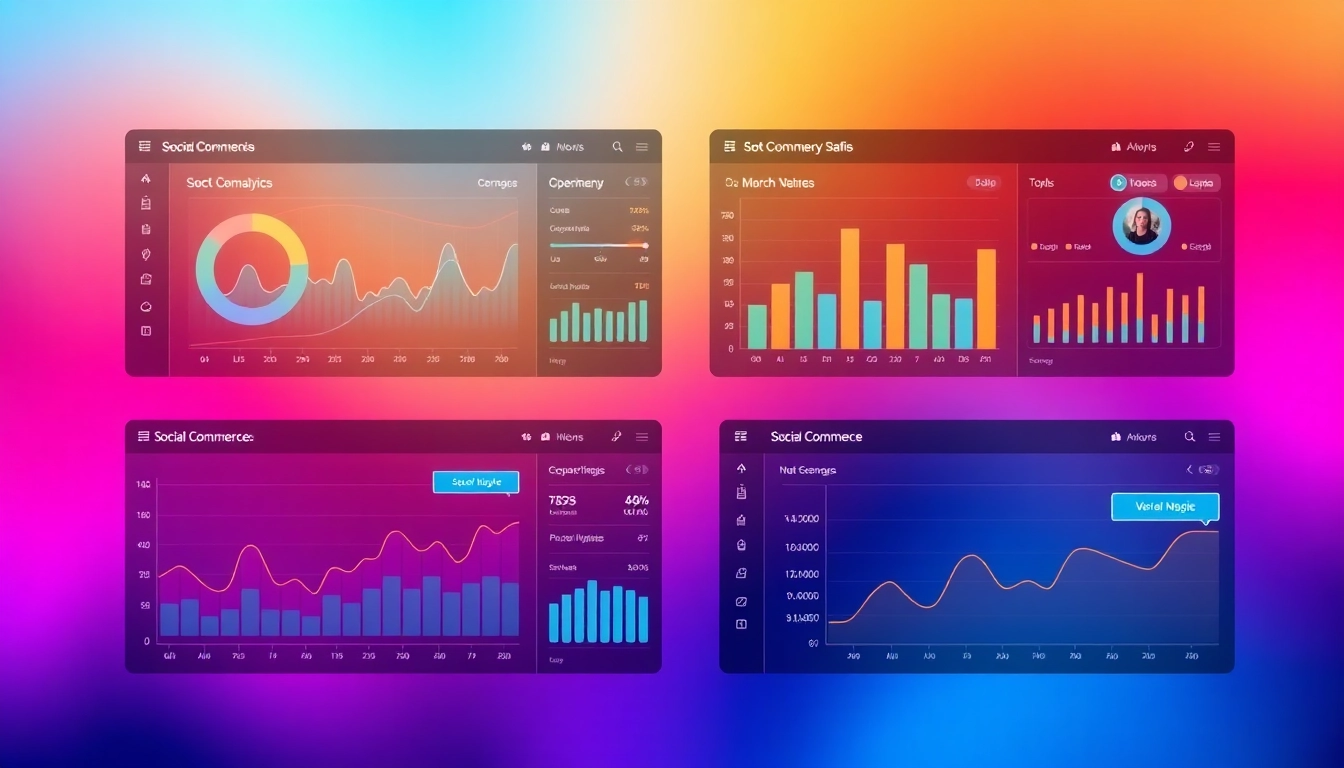Understanding the Foundations of Social Commerce Insights
In today’s hyper-connected digital landscape, social commerce has emerged as a pivotal channel shaping how businesses engage with consumers and drive sales. Its growth is fueled by consumers increasingly relying on social media platforms for product discovery, reviews, and purchase decisions. To stay competitive and maximize ROI, brands must harness the power of Social Commerce Insights. These insights serve as the foundation for understanding consumer behavior, tailoring marketing strategies, and optimizing overall business performance in the social commerce sphere.
Defining Social Commerce and Its Impact on Business
Social commerce refers to the integration of social media and e-commerce functionalities, enabling users to buy products directly within social platforms or through social media-driven pathways. Unlike traditional online shopping, social commerce emphasizes social interactions, peer recommendations, and community engagement, creating a seamless shopping experience that enhances convenience and trust.
This integration significantly impacts business operations by reducing friction in purchase journeys, fostering authentic brand-consumer relationships, and leveraging social proof. For example, platforms such as Instagram Shopping and Facebook Marketplace allow brands to showcase products in highly visual and interactive formats, leading to increased conversions and brand loyalty. As consumer expectations evolve towards more personalized and immediate experiences, social commerce provides a strategic avenue for businesses to capitalize on these trends.
Key Metrics and Data Points in Social Commerce Analysis
To effectively analyze social commerce activities, businesses must focus on key metrics and data points that reflect performance, engagement, and customer sentiment. Critical metrics include:
- Click-Through Rates (CTR): Indicates how many users click on social media posts or ads to visit product pages.
- Conversion Rates: Measures the percentage of visitors who complete a purchase after engaging with social content.
- Engagement Metrics: Likes, comments, shares, and saves that reveal content resonance.
- Return on Investment (ROI): Assesses revenue generated relative to the advertising spend.
- Customer Lifetime Value (CLV): Evaluates future revenue potential from social commerce customers.
Additionally, qualitative data such as customer reviews, sentiments, and feedback provide valuable insights into brand perception and product performance.
Tools and Platforms for Gathering Social Commerce Data
Harnessing the right tools is essential for capturing accurate and actionable social commerce insights. Leading platforms include native analytics dashboards like Facebook Insights, Instagram Analytics, and Twitter Analytics, alongside specialized third-party tools such as Sprout Social, Hootsuite, and Brandwatch.
These platforms offer comprehensive features including demographic analysis, sentiment analysis, competitive benchmarking, and real-time monitoring. For instance, social listening tools enable brands to track brand mentions, trending topics, and emerging consumer needs, facilitating proactive strategies. Integrating data from multiple sources allows for a holistic view of social commerce performance and enables informed decision-making.
Analyzing Consumer Behavior and Engagement Trends
Identifying Buying Patterns Through Social Data
Understanding when, how, and why consumers purchase products on social platforms is key. Analyzing social data reveals patterns such as peak purchasing times, popular product categories, and preferred content formats. For example, trending hashtags or viral posts often correlate with increased sales spikes. Employing cohort analysis helps in segmenting customers based on their buying behaviors, facilitating targeted marketing efforts.
Leveraging Social Listening for Customer Insights
Social listening tools allow brands to monitor conversations that matter most. By analyzing mentions, comments, and reviews, businesses can uncover unmet needs, common complaints, and product preferences. For instance, detecting frequent complaints about a feature can guide product improvements. Moreover, social listening aids in identifying micro-influencers and brand advocates who can be instrumental in expanding reach and credibility.
Measuring Engagement and Content Effectiveness
Engagement metrics are vital indicators of content effectiveness. Metrics such as average engagement rate, content shareability, and comment sentiment reflect how well your content resonates with your audience. Regularly analyzing these metrics helps refine content strategies, focusing on formats and topics that generate meaningful interactions. Case studies suggest that visual content, live videos, and authentic user-generated content tend to yield higher engagement in social commerce contexts.
Implementing Effective Strategies Based on Social Commerce Insights
Optimizing Social Media Campaigns for Better ROI
Data-driven insights enable targeted campaign enhancements. For example, by analyzing which posts generate the highest click-through rates or conversions, marketers can allocate budgets more effectively and craft tailored messaging. A/B testing different creatives, call-to-actions, and audience segments based on prior performance data ensures continuous improvement. Real-world examples show that campaigns focusing on user-generated content and influencer collaborations often outperform traditional ads in social commerce settings.
Personalization and Targeted Marketing Tactics
Personalization is a cornerstone of modern social commerce. Utilizing consumer purchase history, browsing behavior, and social interactions allows brands to deliver customized product recommendations, messages, and offers. Dynamic retargeting campaigns and chatbots equipped with AI further enhance personalization, fostering stronger customer relationships and increasing conversion rates.
Integrating Social Data Into Overall Business Strategy
Successful social commerce strategies are aligned with broader business objectives. Integrating social insights into product development, inventory management, and customer service creates a unified brand experience. Regular cross-departmental reviews of social data ensure that marketing, sales, and product teams remain synchronized, enabling adaptive strategies that respond swiftly to consumer trends.
Monitoring Performance and Adjusting Tactics
Using Data-Driven KPIs to Track Success
Establishing clear KPIs rooted in social data, such as sales attribution, engagement rates, and customer acquisition costs, allows businesses to evaluate their social commerce effectiveness objectively. Consistent KPI tracking provides insights into what strategies are working and where adjustments are needed—informing reallocations of marketing budgets and content focus.
Real-Time Analytics for Agile Decision-Making
The dynamic nature of social media necessitates real-time analytics. Platforms offering live dashboards enable rapid response to campaign performance or emerging crises. This agility allows brands to capitalize on trending topics, rectify negative sentiment quickly, and optimize ongoing campaigns for maximum impact.
Case Studies of Successful Social Commerce Strategies
Many brands have demonstrated the power of leveraging social insights. For example, fashion retailers using real-time sentiment analysis adapted their collections based on trending styles, resulting in increased sales. Others have succeeded by employing micro-influencer campaigns targeted through analytics data, enhancing authenticity and engagement. Analyzing these cases offers practical lessons for implementing tailored social commerce tactics.
Future Trends and Innovations in Social Commerce Insights
Emerging Technologies Shaping Social Commerce
Technologies such as augmented reality (AR), virtual try-ons, and shoppable videos are revolutionizing the social commerce experience. These tools, supported by rich data insights, enable immersive shopping that blends social engagement with enhanced visualization, boosting conversions.
Predictive Analytics and AI in Social Data Analysis
Advancements in artificial intelligence facilitate predictive modeling, allowing brands to anticipate consumer needs and behaviors. AI-powered algorithms can forecast trends, optimize ad targeting, and personalize experiences at scale, transforming reactive strategies into proactive ones.
Preparing for Shifts in Consumer Expectations and Platform Changes
As social media platforms continually evolve, consumer preferences shift accordingly. Forward-looking brands leverage ongoing data collection and analysis to stay ahead, adjusting tactics proactively. Continuous education on emerging features, policy updates, and platform algorithms ensures strategies remain relevant and effective.



